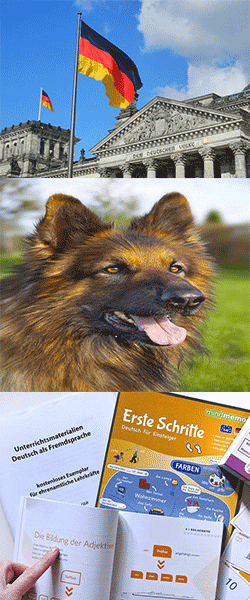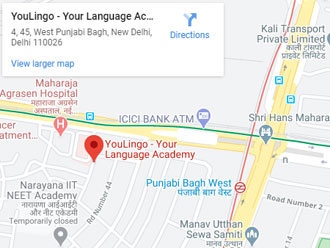
A detailed overview of Best German Language Course offered by YouLingo

German Language Course
Level A1 and A2
A1 is the first part of beginner's levels of German language course. A learner can understand and use familiar everyday expressions. After completion of A1, a student can introduce him/herself and ask others about themselves. At this stage, a learner can communicate if the person they are speaking to speaks slowly and clearly and is willing to help.
After A2 level, a learner can understand commonly used expressions. We expect him/herself to be understood in simple, routine situations dealing with a simple and direct exchange of information on familiar and common topics. A1 & A2 covers the foundation of German language grammar.
Level B1 & B2
These are the intermediate levels of the German language course at this stage we expect a learner to understand the complex texts on concrete and abstract topics. He/she should be able to understand specialized discussions in his/her primary area of specialization. Intermediate level includes a maximum portion of grammar and focuses mostly to enhance the spoken abilities of a learner. An intermediate-level German language speaker will be able to manage professional emails and telephonic conversations independently and will be ready for job interviews in German language. Hence, these levels are the backbone for German language fluency.
Level C1 & C2
These are the advanced levels of German language course which will help a student to understand a wide range of challenging, longer texts and also grasp implicit meanings. In C1 & C2 levels, a learner will surely express him/herself spontaneously with high fluency and precision and can easily have conversations with native German language speakers.
We expect a learner to make clear, structured and detailed statements on complex topics.
Online Best German Language Course
Some Reasons to learn German language
German is one of the most widely spoken languages in the world, and it has the most native speakers in the European Union than English, Spanish or French. German is the gateway to a world-class higher education. International students directly enrolled in German universities pay Zero tuition fees. Germany financially sponsors more than 70,000 international academic exchanges each year. Top universities across the world recommend German language proficiency as it has importance in many fields like medicine, engineering, publishing and research. 22 Nobel Prizes in Physics, 30 in Chemistry, and 25 in Medicine have gone to scientists from the three major German-speaking countries. Germans are world leaders in engineering. Germany creates more business and job opportunities in the world. Some of the top German companies are expanding their business network overseas, and that creates a massive demand for German language experts. German brands which are already in the Indian market are BMW, Daimler, Siemens, Lufthansa, SAP, Bosch, Infineon and BASF. Germany is the world's second-largest exporter, and it is the world's 3rd most robust economy, and it ranks number one in Europe. The economy of the world's Spanish-speaking countries combined is equal to the German economy. Germany's foreign direct investment in India is close to 1500 million dollars. German language courses offered worldover attract a lot of learners every year as it helps them to study and settle in Germany. How Long Does It Take To Learn German Learning German language is easy as it is relatively more similar to the English language. Chances are you will find it a bit tricky if your native language doesn't belong to the Indo-European family of languages. However, you don't need to get discouraged as German is fun to learn; it might seem tricky to you at first, do not get discouraged; you will get along gradually. There are some shortcuts or specific ways to learn German your faculty will help you to know them. Consistency is the key to honing German language skills. Being prepared and punctual for you German language classes will make it easy for you to learn as no fixed period guarantees you will succeed. Learning any language is a gradual process just one step at a time; you'll witness results happening fast. Learning a new language may vary from learner to learner, depending upon how much hard work you put into the learning process. Practice daily for a period of six months; you'll be able to make day to day conversation.
German Language Alphabet
|
Alphabet |
Pronunciation |
Alphabet |
Pronunciation |
|
A |
Ah |
N |
Enn |
|
B |
Beh |
O |
Oh |
|
C |
Tseh |
P |
Peh |
|
D |
Deh |
Q |
Kuh |
|
E |
Eh |
R |
Err |
|
F |
Eff |
S |
Ess |
|
G |
Geh |
T |
Teh |
|
H |
Hah |
U |
Uh |
|
I |
Ih |
V |
Fau |
|
J |
Yott |
W |
Veh |
|
K |
Kah |
X |
Iks |
|
L |
Ell |
Y |
Ypsilon |
|
M |
Emm |
Z |
Tzett |
Greetings and Introduction in German language
|
Hallo! – Hello! |
Wie geht’s? – How are you? |
|
Danke! – Thank you! |
Mir geht’s gut. – I’m doing well |
|
Vielen Dank! – Thank you very much! |
Mir geht’s nicht gut. – I’m not doing well |
|
Willkommen! – Welcome! |
Ich komme aus… – I’m from |
|
Alles Gute zum Geburtstag – Happy Birthday |
Ich bin hier wegen + Genitiv… – I’m here for… |
|
Fröhliche Weihnachten – Merry Christmas |
Bis später! – See you later |
|
Guten Morgen! – Good Morning! |
Tschüß! – Bye! |
|
Guten Abend! – Good evening! |
|
|
Ich hei?e… – My name is… |
|
|
Wie heißen Sie? – What’s your name? |



APPLY NOW